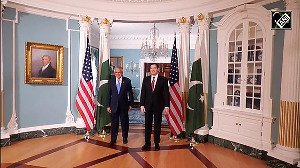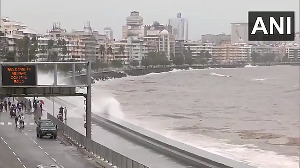Observing that there was no stalemate in the Indo-US nuclear deal and it was proceeding on the basis of 'strict reciprocity', Prime Minister Manmohan Singh on Thursday made it clear in the Rajya Sabha that if the US did not carry out its obligations, India also was not bound to do so.
"If the US does not carry out its obligations, we are also free not to carry out our obligations," he said amidst thumping of desks while responding to supplementary queries during Question Hour.
Seeking to allay members' apprehensions that the US administration has been asking for more concessions ever since the Indo-US nuclear deal was signed on July 18, Singh said the statement jointly issued by President George W Bush and him was a 'binding commitment'.
To repeated questions as to what he meant by reciprocity, Singh said, "I have explained at great length what is meant by reciprocity and I stand by that."
Under the July 18 understanding on civil nuclear energy cooperation, the US President had assured of seeking agreement from the Congress to adjust American laws and policies as also work with friends and allies to enable full civil nuclear energy cooperation and trade with India, Minister of State for External Affairs Rao Inderjit Singh explained in the written reply.
This included expeditious consideration of fuel supplies for safeguarded nuclear reactors at Tarapur. The prime minister had conveyed that India would 'reciprocally agree' and be ready to assume the same responsibilities and practices and acquire the same benefits and advantages as other leading countries with advanced nuclear technology.
These included separation of civilian and military nuclear facilities and programmes in a phased manner and filing a declaration regarding its civilian facilities with the International Atomic Energy Agency.
The prime minister said the second meeting of the Nuclear Working Group will be held later in December.
The Working Group headed by Foreign Secretary Shyam Saran and US Under Secretary Nicholas Burns had held its first meeting on October 21 in New Delhi.
To another query, he said the decision to create certain facilities and reactor was 'entirely an Indian decision'.
"There is no question of any other country forcing India to put this facility or that facility," he asserted.
He said in his written reply that the implementation of the July 18 understanding would be guided 'fully and entirely' by the commitments reflected in the Joint Statement only.
"It has been made very clear to the US, including at the meeting of the Working Group, that our commitments and obligations would only be those that have been spelt out in the Joint Statement," he said adding the two sides have expressed their views on the road ahead and are working to evolve a roadmap.
He said that New Delhi's position remained as conveyed by the prime minister that 'our commitments would be conditional upon, and reciprocal to the US fulfilling its side of this understanding'.
Expecting a close co-relation between the action to be taken by the US and India, he said Indian actions would be contingent at every stage on actions taken by the other side.
"Therefore, the question of US administration asking for more concessions to be made by India and placing the burden of fulfilling commitments contained in the Joint Statement entirely on India does not arise," he added.





